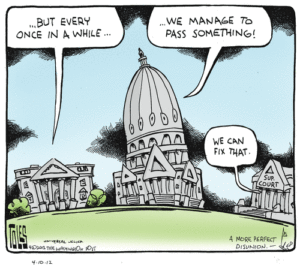
Hey there, Elephant in the Room listeners! I hope you all have been enjoying the show so far this semester as I have had a blast bringing you my favorite news stories of the week, every week. While the show is a great place to talk about the issues, monthly blog posts like these are a great way for me to get more technical than I do on the air. This month, I want to talk about not only the importance of the Supreme Court in this election but of elections and presidents of past. As many of you know, the Supreme Court of the United States is one of the most important and influential judicial bodies both in this country and throughout the world. Many nations look to the U.S. Supreme Court as a guiding light in justice to which they are to base their system of due process. What’s so important isn’t the court its self but rather the minds behind it. Presidents and the Senate are tasked with the tumultuous decision of picking these minds. While new appointments don’t happen often, the next president could very well appoint a brand new majority on the court that could shake the nation to its very core. But this isn’t the first time this has happened. Throughout U.S. history, Presidents have been turning the moral compass of the nation round and round with their Supreme Court appointments, and I don’t imagine that practice will stop anytime soon.
The Supreme Court hasn’t always been such a polarizing piece of politics. When George Washington appointed the very first ten justices, they were picked based on their character and intelligence. More recently, however, it have become a very political issue as more and more legislators begin to rely on the court in passing policy. That isn’t to say that we can’t find instances of controversy on the court within the last 100 years. For example, in the year 1916, Woodrow Wilson appointed Louis D. Brandeis to the court. Brandeis was covered in controversy from the beginning. The outspoken former President William Howard Taft once wrote that Brandeis “is a muckraker, an emotionalist for his own purposes, a socialist, prompted by jealousy, a hypocrite”. Most of his controversy comes from that fact that he was the first nominee of the court to be confirmed in a public Senate hearing which took longer than any other Justice at 125 days. The politicization of the Supreme Court was thought to have begun with Brandeis exactly 100 years ago, but it didn’t stop there. Back in 1968, when Lyndon B. Johnson announced that he wouldn’t seek reelection, he decided to nominate associate justice Abe Fortas to the Supreme Court on his way out the door. Many conservatives balked at the idea of Fortas because he held very liberal views on race relations in addition to being accused of receiving lecture fees from private businesses that could come before the court. Most controversial however was his nomination or lack there of. For the first time ever, the Senate used a filibuster to prevent a Supreme Court nomination and Johnson later rescinded the nomination. The most controversial appointment in recent history, however, belongs to none other than Justice Clarence Thomas. Clarence was chosen by H.W. Bush to replace the soon to be retired, Thurgood Marshall. Most importantly to lawmakers, Thomas would maintain the diversity on the court, as he too was an African American like Marshall. Never the less, controversy arose during his nomination process when he was accused of sexually harassing two former colleagues on the Employment Opportunity Commission (EEOC). Nothing was proven at the time, but five years after his appointment the number of sexual assault cases stemming from the EEOC doubled and awards for the victims were quadrupled.
And now today, Merrick Garland, Obama’s last nomination to a currently balanced court, sits at the forefront of controversy. Should Obama have waited for the next president’s appointment? Possibly, but Garland’s controversy runs deeper than that. Republicans fear his stauncher stance on guns as well as his strides in Environmental and regulatory law. However, given the current state of the election, it would behoove Republicans to confirm Garland. If Hillary Clinton is elected, they can most certainly expect a much more liberal justice than Garland, and that makes passing any legislation for conservatives that much more challenging.
Controversy on the courts is nothing new. All of the justices I listed were very polarizing figures that divided the nation. This election is integral to the court; this time it isn’t just a controversial appointment or two but rather the whole balance of the court is at stake. The last president to get the opportunity to nominate this many Justices Dwight D. Eisenhower in the 1950’s and those appointments set the stage for American Due Process over the next 20 years. The time has come again for the tide of the nation to change, which direction is up to you.
More Posts for Show:
